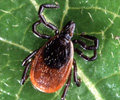A new study reveals that the risk of suffering from various tick borne diseases increases in areas where small, fast-living mammals are abundant.

Richard S. Ostfeld, the paper's lead author and a scientist at the Cary Institute of Ecosystem Studies, has researched the ecology of Lyme disease since 1992. "A pattern emerged in our long-term studies. Ticks that fed on certain rodents and shrews were much more likely to pick up multiple pathogens, making the environment riskier for people."
To investigate why mammals differ in their 'reservoir competence' or ability to transmit pathogens to ticks, Ostfeld and his co-authors from Bard College, Oregon State University, the University of South Florida, and EcoHealth Alliance took a two-pronged approach.
First, they looked at life history traits for nine mammals known to harbor Lyme disease, babesiosis, and anaplasmosis. Attributes like body size, litter size, and life span were taken into consideration.
Then they looked at the role of mammal population density. As 'sit and wait' parasites, ticks are much more likely to encounter animals with dense populations. This, in turn, could help pathogens evolve to exploit specific hosts, resulting in more effective transmission rates.
Advertisement










